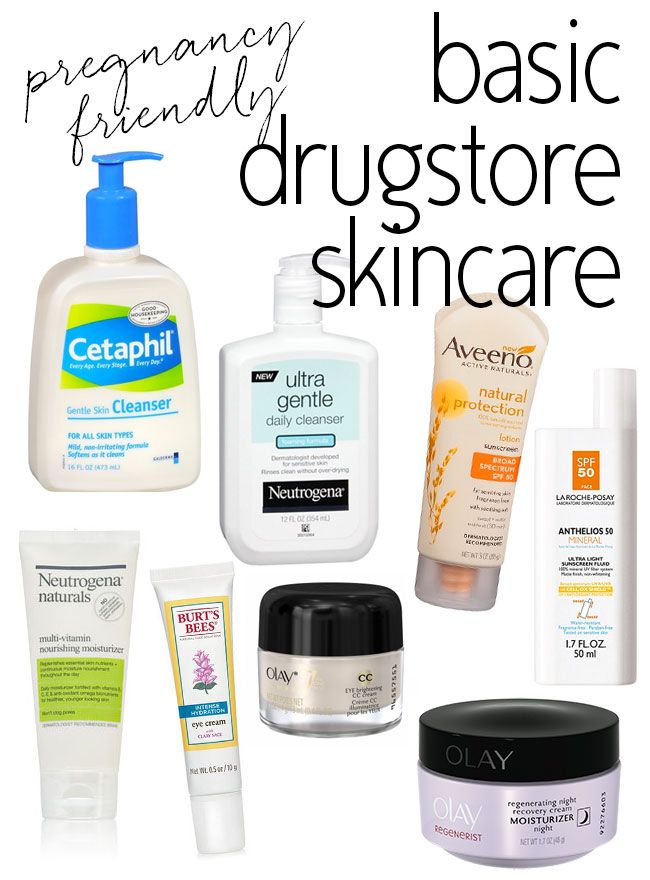Safe Skin Care During Pregnancy

Contents:
Safe Skin Care in Pregnancy
During pregnancy your endocrine profile changes dramatically, affecting your entire body, including your skin. In order to maintain clean, moisturized and healthy skin during pregnancy, you may need to change your usual skin products. Also, many pregnant women wonder if they can safely continue using depilatory creams, anti-wrinkle creams or other skin care products.
The regular use of moisturizer and sunscreen will benefit pregnant women, helping them to prevent stretch marks and dark spots on the skin. However, some skin care products should never be used by pregnant women, as they may endanger the unborn child’s safety. By getting more information about skincare limitations during pregnancy, you will be able to protect your child and keep your skin healthy.
1. Pay attention to any changes of your facial skin, so that you can start fighting the unpleasant changes at the earliest stages.
- Excessive body hair is not uncommon for pregnant women, as well as dry skin or partial skin pigmentation and other skin and hair changes. When you noticed these facial skin problems, you should act quickly to fix them.
- Consult your dermatologist if you have dark spots on your face or other noticeable changes on your skin, which can make you feel uncomfortable or concerned .
2. Avoid oral retinoids, topical retinoids and other oral acne medications.
- A link between oral anti acne medicines (i.e. Accutane) and the adverse birth outcomes was established by scientists, so they should be avoided for the whole pregnancy period. Oral pills intended for skin care and containing salicylic or glycolic acid may also pose a risk to your unborn child.
- Instead of taking pills that control acne and promote better skin health, consult your doctor about switching to creams, lotions or serums, because there is no evidence that these products can cause problems in the development of the fetus. However, it is important to note that some published preliminary researches show that pregnant women should use retinoid skin creams very carefully.
- Remember that some makeup products may also contain salicylic acid or retinoids, and, therefore, could potentially threaten your baby. Find dermatological reviews on cosmetic ingredients that you use most often if you are worried about the consequences of its application.
3. Consult your dermatologist or your doctor about chemical peeling and general body care.
- Although procedures in spa centers and beauty salons may give you a desired result during pregnancy, don’t forget that whole body treatments, chemical peels or bathtubs ensure better penetration of certain cosmetic ingredients through your skin barrier, and they may get into your child’s body.
- If you need to undergo a procedure for medical reasons, or you simply want to enjoy a Spa day, consult your doctor to evaluate the safety of a particular procedure or treatment that you would like to receive.
4. Moisturize your tummy to reduce or prevent stretch marks.

- Oils and lotions, especially those containing shea or cocoa butter and vitamin E, can help to combat stretch marks, especially if you apply them daily. Rub them into your skin up to two or three times a day, after bathing or when you feel that your skin is dry. The use of oils and lotion is also beneficial for other parts of your body with dry skin.
- If possible, use natural moisturizers – it will reduce the amount of chemicals that pass through your skin barrier, getting into a child's body.
5. Use sunscreen regularly. Sunscreen products for external use include very few ingredients that penetrate the skin barrier, so regular use of sunscreen is safe and recommended for pregnant women.
- Sunscreen is not important only to prevent skin damage, it can also be a safe and effective way to treat or prevent melanoderma (dark spots on the skin) in pregnant women.
- In addition, the regular use of sunscreen will make your skin more even and help you to prevent wrinkles. Therefore, you can replace your usual skincare product with a cream with high SPF factor instead of using facial creams that contain dubious ingredients, threatening your child's safety.
- Tanning is a safer option to reach bronze skin color during pregnancy – studies show that only a small amount of active ingredients penetrate your body during tanning.
6. Use body wax and whitening creams moderately. Studies show that the irregular use of wax or other products for hair removal, as well as products for hair bleaching, should not adversely affect your child.
7. Do not use hydroquinone for skin whitening.
- Although there are no definitive studies linking the use of hydroquinone and adverse pregnancy outcomes, most doctors and researchers prefer to completely avoid use of this product because of the potential risk associated with the degree of absorption, which far exceeds the extent of absorption of other skin care products.
- Hydroquinone is often used for treatment of skin discoloration, such as chloasma or melanoderma. Try to replace products containing hydroquinone with sunblocks, unless your doctor says it’s safe to continue the use of your usual skin whitening products.
Tips
- Choose cosmetics marked as “non-comedogenic” or mineral cosmetics in order to reduce the chances of your skin to absorb the ingredients and prevent acne.
- Most women whose skin changed during pregnancy get back to normal life after their hormonal background returns to normal condition after delivery. Since the majority of skin care products are acceptable for use during pregnancy, problems with hair, appearing red spots or dry skin areas can be safely and easily resolved.
- In some cases, unexpected and very noticeable changes in the structure of the skin or its color may indicate health problems. If you have a concern, consult your dermatologist or doctor, guiding your pregnancy.
Warning
- If your job responsibilities include working with chemicals, e.g. hair dye and nail polish, take extra precautions to avoid contact with your skin, wear gloves and other protective equipment.
- Cosmetics and lotions with soy or bergamot oil, which are often used in some organic products, can exacerbate melanoderma, reinforcing the dark spots. Avoid products that contain these two ingredients, if you have dark spots on the skin, although if soy is listed among active ingredients, it won't have such an effect and can be safely used. For women who do not suffer melanoderma, soy containing products are generally safe to use.
- The use of products that is contraindicated during pregnancy can harm your baby. If you have any questions or concerns regarding cosmetic products you want to use, consult your doctor in advance.